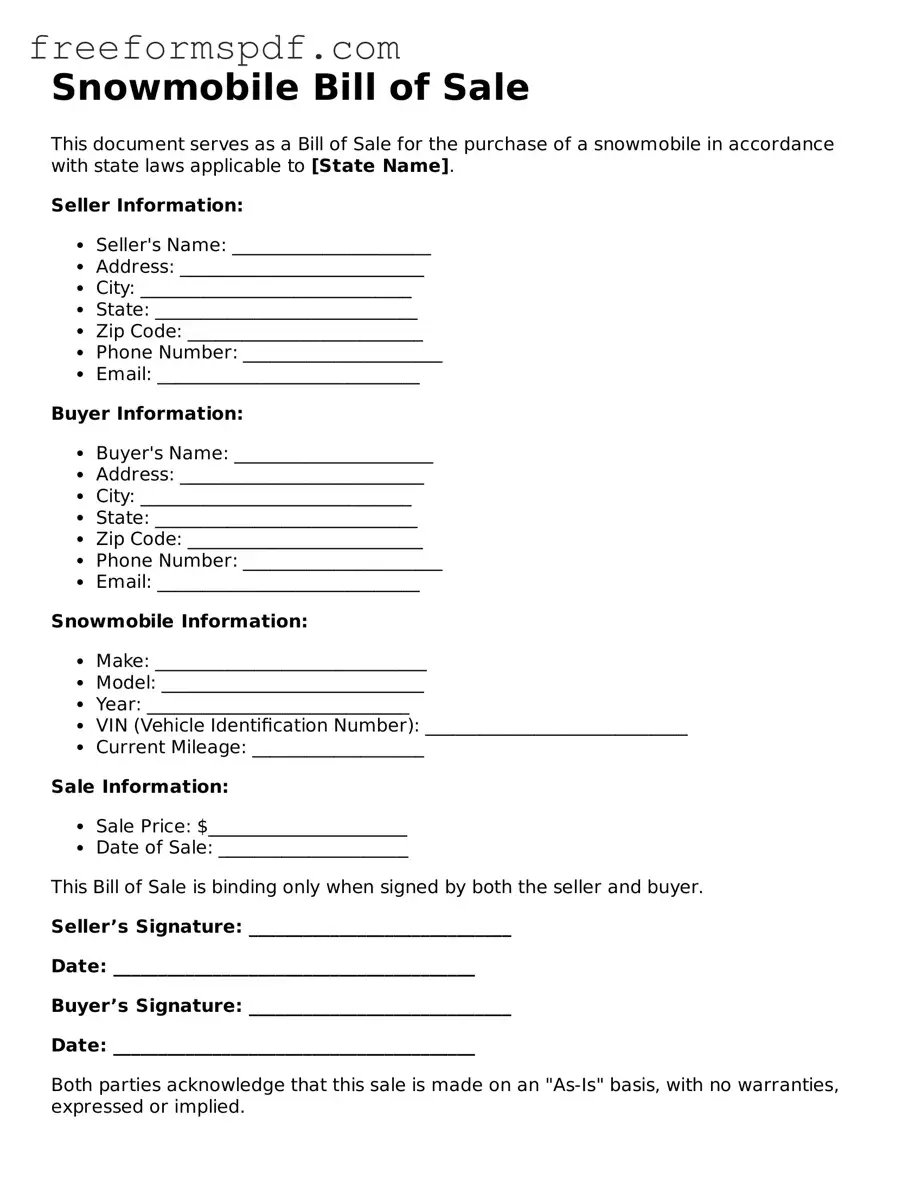Snowmobile Bill of Sale Document
Snowmobile Bill of Sale - Customized for Each State
Common mistakes
-
Incomplete Information: Many individuals forget to fill out all required fields. Missing details such as the buyer’s or seller’s name can lead to complications later.
-
Incorrect Vehicle Identification Number (VIN): Double-checking the VIN is crucial. A single digit error can render the document invalid.
-
Not Including Sale Price: Failing to specify the sale price can create issues for both parties. It’s important for tax purposes and for establishing the value of the transaction.
-
Omitting Signatures: Both the buyer and seller must sign the document. Without signatures, the bill of sale is not legally binding.
-
Neglecting to Date the Document: A date is essential. It clarifies when the sale took place, which can be important for record-keeping.
-
Not Providing a Bill of Sale Copy: Both parties should keep a copy of the bill of sale. This serves as proof of the transaction and can be helpful in case of disputes.
-
Using Inaccurate Descriptions: Describing the snowmobile inaccurately can lead to misunderstandings. Include details like make, model, and year to avoid confusion.
-
Ignoring Local Laws: Each state may have different requirements for a bill of sale. Ignoring these can result in legal issues down the line.
Learn More on This Form
-
What is a Snowmobile Bill of Sale?
A Snowmobile Bill of Sale is a legal document that records the sale and transfer of ownership of a snowmobile from one party to another. This document includes important details such as the names of the buyer and seller, the snowmobile's make, model, year, and Vehicle Identification Number (VIN), as well as the sale price. This form serves as proof of the transaction and can be essential for registration and insurance purposes.
-
Why is a Snowmobile Bill of Sale important?
Having a Snowmobile Bill of Sale is crucial for several reasons. First, it provides a written record of the transaction, which can help resolve any disputes that may arise later. Second, it is often required by state agencies when registering the snowmobile in the new owner's name. Lastly, it can serve as evidence of ownership, which is important for insurance claims or if the snowmobile is stolen.
-
What information should be included in the Snowmobile Bill of Sale?
A comprehensive Snowmobile Bill of Sale should include the following details:
- Full names and addresses of both the buyer and seller
- Description of the snowmobile, including make, model, year, and VIN
- Sale price of the snowmobile
- Date of the sale
- Signatures of both the buyer and seller
Including this information ensures that the document is complete and legally binding.
-
Do I need to have the Snowmobile Bill of Sale notarized?
Notarization requirements for a Snowmobile Bill of Sale vary by state. Some states may require the document to be notarized for it to be considered valid, while others may not. It is advisable to check your state's specific regulations regarding notarization to ensure compliance. Notarizing the document can add an extra layer of authenticity and may help in case of future disputes.
-
Can I create my own Snowmobile Bill of Sale?
Yes, you can create your own Snowmobile Bill of Sale. However, it is essential to ensure that all necessary information is included and that the document complies with your state’s laws. Many templates are available online that can guide you in creating a proper bill of sale. Alternatively, purchasing a pre-made form can simplify the process and ensure that all legal requirements are met.
Misconceptions
Understanding the Snowmobile Bill of Sale form is essential for both buyers and sellers. However, several misconceptions can lead to confusion. Here are eight common misconceptions explained.
- It is not legally required. Many believe that a bill of sale is optional. In fact, it serves as a crucial legal document that provides proof of ownership transfer.
- All states have the same requirements. Requirements for a bill of sale can vary by state. Buyers and sellers must check local regulations to ensure compliance.
- It only benefits the seller. While it protects the seller by documenting the sale, it also benefits the buyer by providing proof of purchase and ownership.
- Verbal agreements are sufficient. Some think a verbal agreement is enough to finalize a sale. However, without a written bill of sale, disputes may arise later.
- It does not need to be notarized. Many assume notarization is unnecessary. In some states, having the document notarized can add an extra layer of protection.
- Only new snowmobiles require a bill of sale. This is incorrect. A bill of sale is needed for both new and used snowmobiles to ensure proper ownership transfer.
- It is only for private sales. Some think bills of sale are only relevant for private transactions. However, they are also important for sales through dealerships.
- It does not need to include specific details. A common misconception is that the bill of sale can be vague. In reality, it should include detailed information about the snowmobile, the buyer, and the seller.
Clearing up these misconceptions can help ensure a smooth transaction when buying or selling a snowmobile.
Other Types of Snowmobile Bill of Sale Forms:
Motorcycle Sale Agreement - Prevents potential legal issues related to the sale.
For those seeking to navigate the complexities of tax certifications, the New York DTF-84 form plays a pivotal role as it allows businesses to verify their status as Qualified Empire Zone Enterprises (QEZE). To streamline the application process, resources such as NY Templates can provide valuable assistance in ensuring all necessary documentation is accurately compiled and submitted.
Bill of Sale for Furniture - Creates an official documentation trail for transactions.
